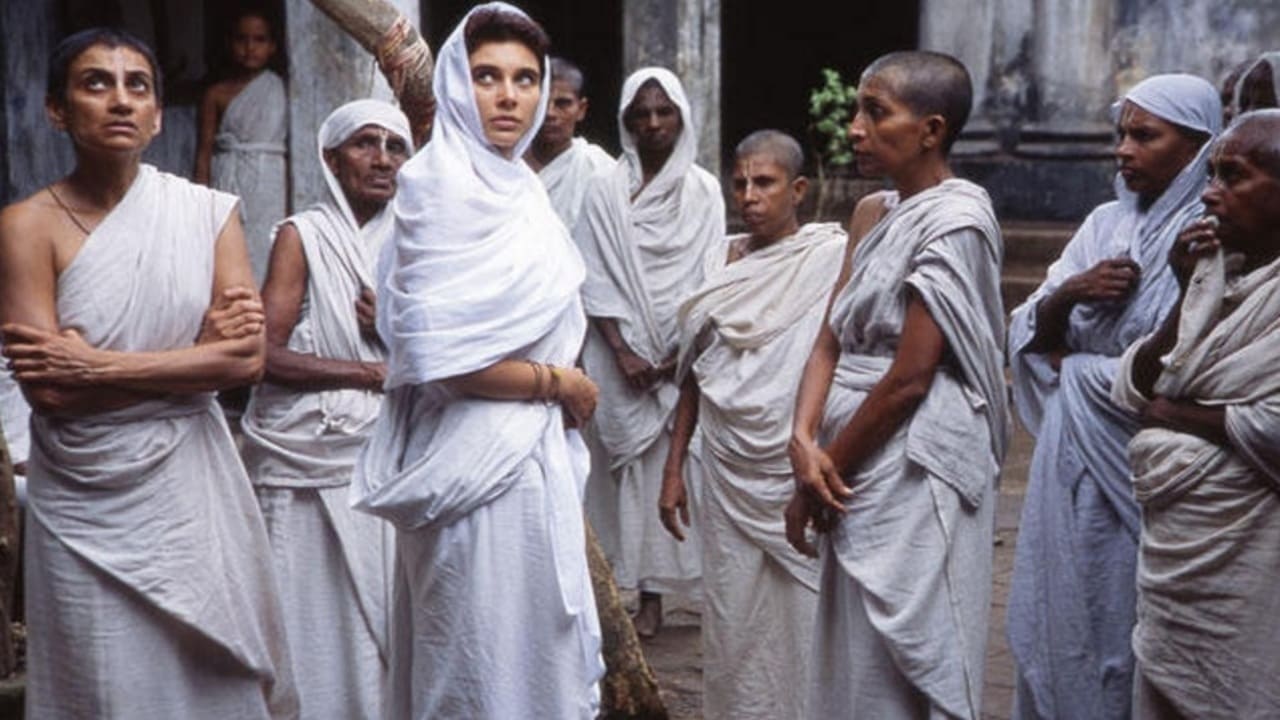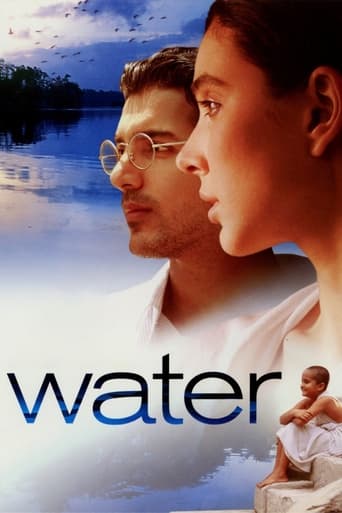

Surprisingly incoherent and boring
... View Morenot as good as all the hype
... View MoreThe biggest problem with this movie is it’s a little better than you think it might be, which somehow makes it worse. As in, it takes itself a bit too seriously, which makes most of the movie feel kind of dull.
... View MoreThis movie feels like it was made purely to piss off people who want good shows
... View MoreMovie is so emotional that you can't hold your tears. It a love story of a widow woman and man from 1938. It lot of social practice were present in back those days in India which people call it culture. I almost cried at the end and didn't went how I was expecting. Main theme of movie is to show how social evil practice were present like child marriage, widow have to live their life miserable. And in the name of culture they were running sex. I don't want to spoil the movie so I'll keep it short. I don't know why this movie is banned in India even after Independence and when all social evil practice are stopped. I think the mind set of people is still not developed on these issues.
... View MoreWater is a movie about widows that don't really try to escape being a widow or get remarried but one woman thought it was right and she should be able to get remarried. I think this movie is trying to tell us that if you truly believe it is right, and try, it can be achieved. This is kind of like living up to your own world-view. One example of someone living up to their world-view is when one widow wanted to get married and all the other widows wanted to stop her because they believed it would curse them. She fought through them and was able to take down the peer pressure because she truly loved that man. Her whole community was against her but she still was able to go for what she believed was right. Chuyia (the little girl) also showed how she tried to fight for her world-view because when she announced that one of the widows were going to get married, one of the older widows said she couldn't. Chuyia started stepping harshly on the older widow which shows how she was standing for what she believed was right. A final example of a widow trying to what she believes is right is when Didi takes the key from the elderly widow who locked up the widow that wanted to get married. She freed the widow so she could get married, but she knew this would make many have no respect for her. Overall many people in this movie did what they truly believed was the right thing to do in their situation, and some went beyond Gods commandments, not sure if God would be okay with it but it was her world-view and she thought it was true.Arc of Movie: This movie talked about a young widow (around 7 years old) being taken to a widow house with many other widows. She meets a widow named Kalyani who meets a man and wants to marry this man. Other widows say if she marries this man she will get cursed. Kalyani commits suicide and another widow doesn't want Chuyia (the little girl) to live with the other widows in their sad life so she gave Chuyia to the handsome man that Kalyani wanted to marry, when he was on a train with Gandhi.
... View MoreImagine being a widow at the age of eight and having to live the rest of your life as an outcast in renunciation. The movie "Water" explores this aspect of Hinduism that is viewed as sinful in western culture. "Water" takes place in India during the year of 1938 when laws existed to give widows the freedom of marriage, but however, as said by one character "We do not always follow the law when it is inconvenient." Torn, Chuyia(Sarala Kariyasam) was forced to live in a ashram controlled by other lifelong widows. In the ashram Chuyia befriends a beautiful widow named Kalyani(Lisa Ray) who was the only one allowed to have long hair. This was because the leader of the ashram Madhumati(Manorama) made arrangements with pimp Gulabi(Raghuvir Yadav) to supply Kalyani to their wealthy clients as a source of income. Chuyia later meets another older widow named Shakuntala(Seema Biswas) who was rather wise and questions the foundation of widowhood. One day Kalyani and Chuyia run into a man named Narayan(John Abraham), upon seeing Kalyani he immediate falls in love. Narayan is a young and charming upper-class follower of Mahatma Gandhi. He later gives the most pragmatic explanation for the practice of widowhood: "One less mouth to feed, four less saris, and a free corner in the house. Disguised as religion, it's just about money." Through countless amount of attempts and huge amounts of effort, Kalyani finally starts to converse with Narayan. Shortly after, they decide to get married, this angered Madhumati who then cut Kalyani's hair and locked her in her room. After a long debate with herself, Shakuntala demands for the key to Kalyani's room and frees her. Narayan takes Kalyani on a small rowboat to his house to meet his parents, however Kalyani immediately recognizes the house and the house of one of her clients, she orders Narayan to turn around. The embarrassment and grief was too much for Kalyani to handle, therefore she committed suicide by drowning herself. Meanwhile, Madhuati send Chuyia away with Gulabi to be prostituted as a replacement for Kalyani. Upon realizing, Shakuntala runs to the shore to try and prevent the worst, but only in time for Chuyia's return. Shakuntala is destroyed by this and cradles Chuyia in her arms while she spends her nigh sitting at the shore. While walking through town with Chuyia she hears about Gandhi's departure at the train station, Shakuntala follows the crowd to receive his blessing before he leaves. As an act of despair Shakuntala runs along side the train asking people to take Chuyia with them and put her under the care of Gandhi. Luckily, she spots Narayan on the train and gives Chuyia to him, the train departs leaving Shakuntala behind in tears and taking Chuyia into a hopefully brighter future. An aspect of Water that I liked was how they involved the young girl and the experience seen though her eyes, so that all the viewers can in a way empathize with Chuyia. I feel that the movie would have been good enough with Chuyia's story along but the romantic aspect of Kalyani and Narayan just added to the emotions felt during the movie. The love story does not end happily which helps set the mood of there still being a glimpse of hope at the ending. In my opinion, I really like how the romantic aspect was incorporated into the movie, but more so I like the way Shakuntala was questioning the very morals behind the underpinning of her society. Although the romantic aspect were good, I fell that they could have been developed more. To be honest, I was a bit disappointed when Kalyani drowned herself, I was hoping for a more hopeful ending to the romantic aspect of the story. For example, once they are married Kalyani takes Chuyia with her to start a new life elsewhere.
... View MoreAlthough slow-moving at first, Water eases the viewer into a world of oppression, drugs, and unfairness. Chuyia's naive attitude towards the widow houses highlights the injustices endured by widows in India. In particular, her question about where the men widows are highlight the sexism present in traditional Hindu customs. Only women have to endure the tragic life that is being a widow. The environment of the widows gradually worsens, with the themes of tradition, drugs, and prostitution being highlighted in the movie. This contrasts with the life of luxury that the upper class and Brahmins live. However, despite all that, at the core of the story is a love story between Kalyani and Narayan. Despite the surrounding environment, their love gives them hope and strength. In a stunning plot twist, realization and circumstance crush the hopes of Kalyani and Narayan's love. Their sad tale ends with Kalyani's suicide, and Chuyia taking her place to be ferried across the river as a prostitute. Shakatula, Chuyia's friend, sends her away. She realizes there is no future for Chuyia in the widow house anymore.This movie effectively utilizes a slow pace and build-up of the story so that we as viewers can better relate to the characters in the story. When the horrors of the widow house are slowly revealed, a sense of empathy is felt. When the cause of the horrors are revealed to be the result of systematic corruption of laws and outdated tradition, it brings out a sense of anger. The tragic love story and the ending captions just amplify this sense of injustice, forcing people to realize that these unfair Hindu customs need to be changed.
... View More